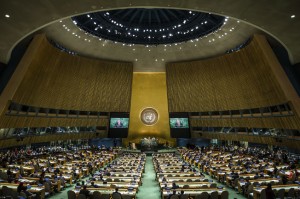Confronting Religious Terrorism as a UN Mandate
 The UN General Assembly in New York.
The UN General Assembly in New York. “I am Yezidi and what can be done by the United Nations and civil society groups to stop the genocide of my people by ISIS religious militants?”
This was a question asked by Mirza Ismail, founder and chairman of the Yezidi Human Rights Organization and the Yezidi representative to the UN’s Freedom of Religion and Belief group. He was joined by other NGOs and civil society groups in October to hear the special rapporteur’s annual report on religious violence. Ismail continued:
So far, the only people who have helped us are the Jews and the Hindus. Seven thousand of our men have been murdered. Thousands of women stolen, and children abducted and forced to train to become bombers and militants.
The panel responded by offering platitudes and ultimately no firm answer. That’s because the right question was asked to the wrong people—not because everyone in the room was unconcerned for the Yezidis. The truth is there is little any of us can do without the collective support of the UN and the nations with the diplomatic and military will to help those being harmed by ISIS.
Indeed, the French academic on the review panel suggested that perhaps the only way to save the Yezidi people would be to remove them totally from their ancestral lands rather than fully confront ISIS. At the program’s next session, I spoke with Ismail and told him I was a bit shocked by this response. He had been too, and in fact had spoken to her afterwards to express his concerns regarding her solution.
Perhaps the ongoing campaign against both secular democracy and ethnic minorities occurring in places like Paris, Baghdad, Kenya and Beirut can be ended when we finally take seriously and are in full compliance with the UN Declaration of Human Rights. Otherwise, soft targets will forever give religious terrorists the opportunity to harm their opponents and indiscriminately kill the innocent. We need a broad coalition and it will take more than the Western powers to make this happen. It will take UN support.
To be fair, Rapporteur Dr. Heiner Bielefeldt had left the meeting before Ismail’s questions. However, earlier in the program, Bielefeldt clearly noted that the special rapporteur stands for the rights of minority populations when he conveyed that human rights must be defended in the real world and that human rights are not just a philosophical construct.
In his review of the report, Bielefeldt also noted that while we must take into account cultural, legal, and multilinguistic perspectives, human rights are to be universally enforced by governing institutions if they are to have meaning; it is only through these recognized institutions that hold “legitimate power” that we can hold governmental and non-governmental state actors accountable for their violent actions against religious and ethnic minorities as well as secularists and nonbelievers.
Freedom of religion is guaranteed in the UN Declaration of Human Rights. NGOs and diplomats must honor these rights, as we should all other national and international accords that protect citizens from harm—especially when religion and faith are used to justify violence, intimidation, and outright persecution of defenseless populations who have no shelter or support.
In this same meeting, there seemed to be almost universal agreement by those representing their religious organizations that violence in the name of religious faith should be viewed within the historical context in which the actions were taken. To me, this seems to be a universal and apologist view that allows many to explain away religious violence by placing it into a historical and often biased context to suit a supposition that religion belief itself is “neutral” and that it is the interpretation of faith that is the problem.
And, I will grant you that we may be able to draw a line from the invasion of Iraq to the success of ISIS, placing much of the blame on the United States and Western allies for their shortsighted military initiatives, intelligence failures, and diplomatic misfires. But that doesn’t mean the United States and its allies are directly responsible for the killing of Yezidis which has occurred for generations. Neither are they responsible for the destruction of world heritage sites or the throwing of suspected gay men from rooftops by ISIS militants. Going backwards in time does not and should not mean we don’t hold those accountable who readily and directly are accountable for war crimes and crimes against humanity in today’s real world.
So, as the world continues to revolve, let’s hope our political systems evolve as well—and towards a common secular humanity. It perhaps remains the only truly peaceful way forward.
